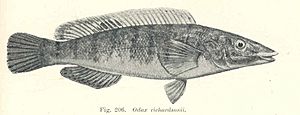Microcotyle odacis facts for kids
Quick facts for kids Microcotyle odacis |
|
|---|---|
| Scientific classification | |
| Genus: |
Microcotyle
|
| Species: |
odacis
|
| Synonyms | |
|
|
Microcotyle odacis is a tiny worm that lives on the gills of marine fish. It is a type of parasite, which means it lives on another animal and gets its food from it. This worm belongs to a group called monogeneans and is part of the Microcotylidae family.
Discovery of Microcotyle odacis
This interesting worm was first found and described by a scientist named Sandars in 1945. They studied 15 samples of the worm, which were all found on the gills of a fish called Odax semifasciatus. This fish is now known as the Haletta semifasciata. Later, other scientists looked at Microcotyle odacis again. They added more details to its description and drawings, helping us understand it better.
What Microcotyle odacis Looks Like
Microcotyle odacis has a long, symmetrical body, meaning both sides are the same. It has two main parts. The front part holds most of its important organs. The back part is called the haptor.
The haptor is special because it helps the worm hold on. It has two rows of clamps, like tiny clips, that attach the worm firmly to the fish's gill. There are usually about 28 clamps on one side and 30 on the other. At the very front of the worm, it has two strong, muscular suckers. These also help it attach and feed.
Inside its body, Microcotyle odacis has a mouth at the front. It also has a small, round pharynx (like a throat) and an oesophagus. Its intestine has two main branches that spread out and have many smaller branches. These branches even go into the haptor. Like many worms, each adult Microcotyle odacis has both male and female reproductive organs.
Where Microcotyle odacis Lives
The main fish that Microcotyle odacis lives on is the blue weed-whiting, which is scientifically known as Haletta semifasciata. This fish belongs to the Odacidae family.
Scientists first found Microcotyle odacis living on this fish off the coast of Australia. It has been reported from the same fish and location multiple times since its discovery.


